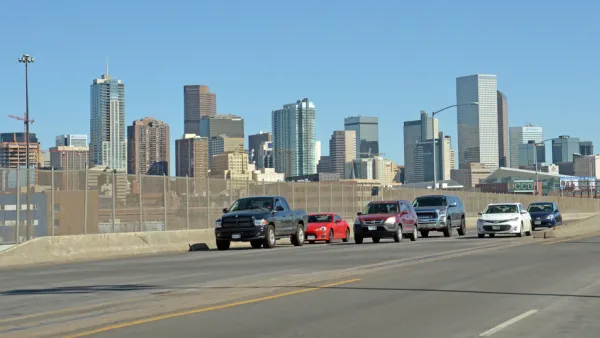Unlike prior initiatives that sought drilling bans, Prop. 112 would greatly increase setbacks from buildings to such an extent that it could doom much of the industry. A competing initiative would make the change a "taking" and require compensation.

At the 2018 Energy Summit last month in Denver, put on by the Colorado Oil and Gas Association, anti-fracking hecklers interrupted a presentation by Rep. Jared Polis (D- Boulder), also the Democratic gubernatorial candidate, asking him "whether he was doing enough to protect against hydraulic fracturing near homes," reported John Aguilar for The Denver Post on Aug. 22.
Looming over the gubernatorial race is Initiative 97 ... [which] aims to increase the distance new oil and gas wells need to be from homes and schools to 2,500 feet from the current 500-foot and 1,000-foot setbacks, respectively.
Critics of the measure say it will box out more than 80 percent of non-federal land in the state from drilling, while its backers say that an intensive industrial activity like energy extraction needs to be moved further away from where people live, work and play. Both Polis and his Republican opponent, state treasurer Walker Stapleton, have come out against Initiative 97.
“A 2,500-foot setback would shut down Colorado’s oil and natural gas industry and lead to a massive layoff of over 100,000 local jobs,” Scott Prestidge, spokesman for the Colorado Oil and Gas Association, said July 9, reported Aguilar earlier. Proponents are more focused on public health.
“Toxic, industrial and dangerous activity like fracking doesn’t belong in our neighborhoods, near our kids’ schools or near our water supplies,” said Micah Parkin, [executive director and co-founder of 350 Colorado], who sits on the board of Colorado Rising, a fracking watchdog group promoting the measure. “These are really common-sense regulations.”
Since Aguilar's reporting, the initiated state statute has qualified for the ballot, writes Colorado Public Radio's (CPR) energy and environment reporter, Grace Hood, on Aug. 29.
Initiative 97 — which will appear as Proposition 112 on the ballot — would increase setbacks between new wells and homes, offices, rivers and playgrounds to 2,500 feet. Current oil and gas setbacks range between 500 feet for homes and 1,000 feet for higher occupancy buildings.
Anne Lee Foster, with the environmental group Colorado Rising, insisted the 2,500-foot setback is “not just an arbitrary number like the current setback is.” Instead, it’s a number “based on science,” that comes from a 2012 University of Colorado study that found people living within a half mile (2,640 feet) of wells had a greater risk for health effects compared to those living further away.
Competing initiative funded by oil and gas industry
"Private property rights advocates have secured a spot on the November Ballot," reports Hood on Aug. 28. The measure is sponsored by the Colorado Farm Bureau with financial backing from the oil and gas industry.
The initiative [#108], which is expected to appear as Amendment 74 at the ballot box, would allow Coloradans to make a financial claim on property that’s devalued because of government action. The proposal would protect water and mineral rights in addition to physical property.
At its heart, Amendment 74 would adjust how “takings claims” work under Colorado law...The change to the state constitution would broaden that range so that property owners could get compensated if property is “reduced in fair market value” by the government.
"They have more campaign money than any political group in Colorado right now," reported Ben Markus for CPR on June 1. "Protect Colorado, created by the state’s largest oil and gas companies, has raised $8.4 million in contributions to fight for, they say, the very future of drilling in the state." [Audio version accessible].
"The proposed constitutional amendment is opposed by the Colorado Municipal League, which says it could chill future regulatory efforts by local governments," adds Hood. Denver City Council member Deborah Ortega pens an opinion for Colorado Politics on Sept. 3 on how the amendment would be financially devastating to both local and state governments.
The source article, the most current CPR report on the two measures, is very brief. Click on the audio to listen to a longer, informative discussion between Hood and Ryan Warner, host of "Colorado Matters." Hood mentions the significance of a house explosion on April 27, 2017, in Firestone (Weld County), Colorado associated with a natural gas pipeline from an Anadarko Petroleum well that killed two people and injured one person.
"I really wonder to what extent this issue will become a referendum on preventing another Firestone-type incident," states Hood.
Hat tip to The Wall Street Journal's Energy Journal.
FULL STORY: Here's What's Behind The Clashing Ballot Measures Over Oil And Gas Development

National Parks Layoffs Will Cause Communities to Lose Billions
Thousands of essential park workers were laid off this week, just before the busy spring break season.

Retro-silient?: America’s First “Eco-burb,” The Woodlands Turns 50
A master-planned community north of Houston offers lessons on green infrastructure and resilient design, but falls short of its founder’s lofty affordability and walkability goals.

Delivering for America Plan Will Downgrade Mail Service in at Least 49.5 Percent of Zip Codes
Republican and Democrat lawmakers criticize the plan for its disproportionate negative impact on rural communities.

Test News Post 1
This is a summary

Test News Headline 46
Test for the image on the front page.

Balancing Bombs and Butterflies: How the National Guard Protects a Rare Species
The National Guard at Fort Indiantown Gap uses GIS technology and land management strategies to balance military training with conservation efforts, ensuring the survival of the rare eastern regal fritillary butterfly.
Urban Design for Planners 1: Software Tools
This six-course series explores essential urban design concepts using open source software and equips planners with the tools they need to participate fully in the urban design process.
Planning for Universal Design
Learn the tools for implementing Universal Design in planning regulations.
EMC Planning Group, Inc.
Planetizen
Planetizen
Mpact (formerly Rail~Volution)
Great Falls Development Authority, Inc.
HUDs Office of Policy Development and Research
NYU Wagner Graduate School of Public Service





























